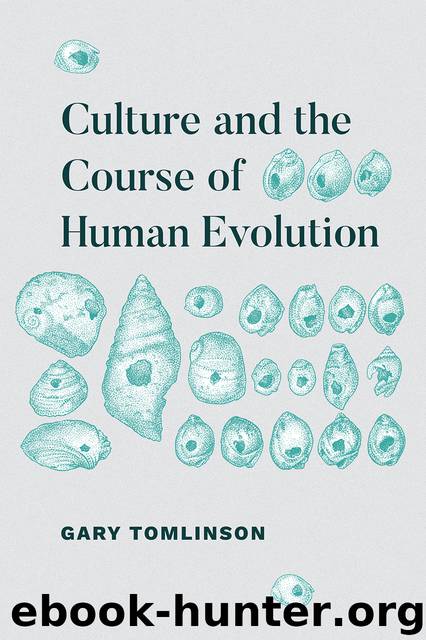Culture and the Course of Human Evolution by Tomlinson Gary

Author:Tomlinson, Gary
Language: eng
Format: epub
Publisher: The University of Chicago Press
Published: 2018-03-12T16:00:00+00:00
: 4 :
Emergence
As cultural systems grew more intricate, with greater numbers of components, more complicated relations among them, and clearer hierarchization of parts or processes, a new feature appeared in hominin culture: emergence. In the wake of complexity theory and dynamic systems analysis, this concept has been the subject of debates that touch the heart of scientific inquiry. At the same time it has taken on a broad currency in nonscientific academic discourses ranging from quantitative social sciences to computational humanities. It will be an important ingredient in my analysis, so it is well to be clear what I mean by it.
Emergence denotes the presence of properties, features, behaviors, or capacities that appear in systems but are not easily traceable to their component parts. Not all systematic arrays are emergent, but without system, emergence cannot occur. Many of the cases of emergence discussed by theorists involve open thermodynamic systems, which take in energy from and exchange materials with their environments and maintain their identity through networked interactions of their component parts; a living cell is the classic example. Systems need not be open and dynamic in this way to show emergent features, however. Liquidity is often thought of as an emergent feature in aggregates of certain molecules (for example, water molecules), and these aggregates are not in themselves open systems. Hominin culture, meanwhile, has long been able to create static emergent systems, that is, nondynamic systems that show capacities or fulfill functions beyond the reach of their components taken individually; a Neandertal spear is a clear example: an emergent tool.
There is a qualification in my definition—“not easily traceable.” The question of how easy it is to trace the behavior of a system back to the properties of its parts is a fundamental issue in debates on emergence and has prompted whole typologies of it. Philosophers of science William Bechtel and Robert Richardson (2010) frame this problem as one of decomposability, in essence asking how full an explanation of a system we can achieve by breaking it down into its parts and understanding individually their properties. This leads them to a tripartite typology. The liquidity of water is well explained through an understanding of the ionic properties of water molecules and the atoms that make them up, so water is a decomposable emergent system; the same could be said for the spear. Other systems are near-decomposable, and still others appear to be nondecomposable. Bechtel and Richardson offer these last systems as full-fledged cases of emergence. Philosopher Mark Bedau (2002), working from artificial-life simulations, arrives at a similar tripartite scheme and calls his categories “nominal,” “weak,” and “strong” emergence. The emergent feature of life in a cell or organism is one often-adduced instance of the last type, strong or nondecomposable emergence; consciousness or mind in neural networks is another.
But are these cases truly nondecomposable? Some philosophers of science think not. They view the whole concept of emergence as an epistemological shadow play, a matter of our state of knowledge and not of
Download
This site does not store any files on its server. We only index and link to content provided by other sites. Please contact the content providers to delete copyright contents if any and email us, we'll remove relevant links or contents immediately.
| Biographies | Business |
| History & Criticism | Instruments |
| Musical Genres | Recording & Sound |
| Reference | Songbooks |
| Theory, Composition & Performance |
The Goal (Off-Campus #4) by Elle Kennedy(13602)
Kathy Andrews Collection by Kathy Andrews(11765)
Diary of a Player by Brad Paisley(7520)
What Does This Button Do? by Bruce Dickinson(6168)
Assassin’s Fate by Robin Hobb(6162)
Big Little Lies by Liane Moriarty(5745)
Altered Sensations by David Pantalony(5071)
Pale Blue Dot by Carl Sagan(4953)
Sticky Fingers by Joe Hagan(4143)
The Death of the Heart by Elizabeth Bowen(3578)
The Heroin Diaries by Nikki Sixx(3516)
Beneath These Shadows by Meghan March(3281)
Confessions of a Video Vixen by Karrine Steffans(3273)
How Music Works by David Byrne(3234)
The Help by Kathryn Stockett(3115)
Jam by Jam (epub)(3048)
Harry Potter 4 - Harry Potter and The Goblet of Fire by J.K.Rowling(3031)
Computational Linguistics and Intelligent Text Processing: 20th International Conference, CICLing 2019 La Rochelle, France, April 7â13, 2019 Revised Selected Papers, Part I by Alexander Gelbukh(2966)
Strange Fascination: David Bowie: The Definitive Story by David Buckley(2833)
